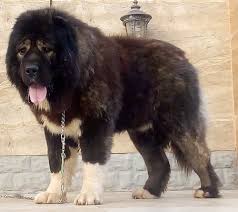
Georgian Shepherd
Conditions of detention
Georgian Shepherds thrive in rural or suburban environments where they have ample space to roam and patrol. They are not well-suited to apartment living due to their size and exercise needs. These dogs prefer cooler climates and need access to a secure outdoor area.
Useful Fact: Georgian Shepherds have a strong territorial instinct and do best in homes with large, securely fenced yards.
Nutrition and diet
A balanced diet is essential for the health and vitality of the Georgian Shepherd. High-quality commercial dog food that provides a good mix of protein, fats, and carbohydrates is recommended. Their diet should also include essential vitamins and minerals to support their large, muscular build.
Useful Fact: Due to their size, Georgian Shepherds may require a diet that includes joint supplements to maintain their skeletal health.
Health
Georgian Shepherds are generally robust and healthy, but like all large breeds, they are prone to certain health issues. Common concerns include hip dysplasia, elbow dysplasia, and heart conditions. Regular veterinary check-ups and a healthy lifestyle are crucial for managing these conditions.
Useful Fact: Regular exercise helps maintain muscle tone and prevent obesity, which can exacerbate joint issues in large breeds.
Grooming and care
The Georgian Shepherd has a thick, double coat that provides excellent protection against harsh weather. Their coat requires regular grooming to prevent matting and reduce shedding. Brushing at least two to three times a week is recommended, with more frequent grooming during shedding seasons.
Useful Fact: Bathing should be done as needed, typically every few months, using a gentle dog shampoo to maintain their coat’s natural oils.
Education and training
Georgian Shepherds are intelligent and independent, which can make training a challenge. Consistent, positive reinforcement methods work best. Early socialization and obedience training are essential to ensure they grow into well-behaved adults.
Useful Fact: Due to their strong protective instincts, it’s important to establish yourself as a confident leader during training.
Toys and entertainment
Georgian Shepherds enjoy a variety of toys and games that keep them mentally and physically stimulated. Sturdy chew toys, interactive puzzles, and fetch toys can help keep them entertained. They particularly enjoy activities that engage their problem-solving abilities.
Useful Fact: Providing toys that challenge their intelligence can help prevent boredom and destructive behavior.
Safety
Due to their protective nature and large size, Georgian Shepherds should be supervised around strangers and other animals. They should be kept on a leash or in a securely fenced area when outdoors to prevent them from wandering off or acting aggressively towards perceived threats.
Useful Fact: Microchipping and ID tags are essential for ensuring they can be returned if they get lost.
Accessories
A comfortable, sturdy harness is recommended for walks, as Georgian Shepherds are strong and may pull on the leash. They may also benefit from a cooling vest during hot weather to prevent overheating.
Useful Fact: Reflective gear can enhance visibility during evening walks, ensuring their safety
Socialization
Early socialization is crucial for Georgian Shepherds. Exposing them to various people, environments, and other animals helps prevent shyness or aggression. Puppy classes and regular outings can be beneficial.
Useful Fact: Positive experiences during socialization help them develop into confident and well-adjusted adults
Travel and Transportation
Georgian Shepherds generally travel well if introduced to car rides from a young age. Ensure their safety and comfort by using a secure crate or dog seat belt during car travel. Regular breaks during long trips are important for their comfort.
Useful Fact: Familiarizing them with travel crates and carriers can make journeys less stressful and more enjoyable.
Behavior and psychology
Georgian Shepherds are known for their loyal, protective, and intelligent nature. They form strong bonds with their families and are generally good with children and other pets. Understanding their high energy levels and providing sufficient exercise and mental stimulation can help manage their behavior.
Useful Fact: Their protective instincts make them excellent guard dogs, but they require consistent training to ensure they are well-mannered.
Legal aspects
Owning a Georgian Shepherd requires understanding and adhering to local pet ownership laws, including leash laws, noise regulations, and registration requirements. Microchipping your dog is recommended for identification purposes.
Useful Fact: Some areas may have specific regulations regarding large and protective breeds, so check local requirements if you plan to own a Georgian Shepherd.


